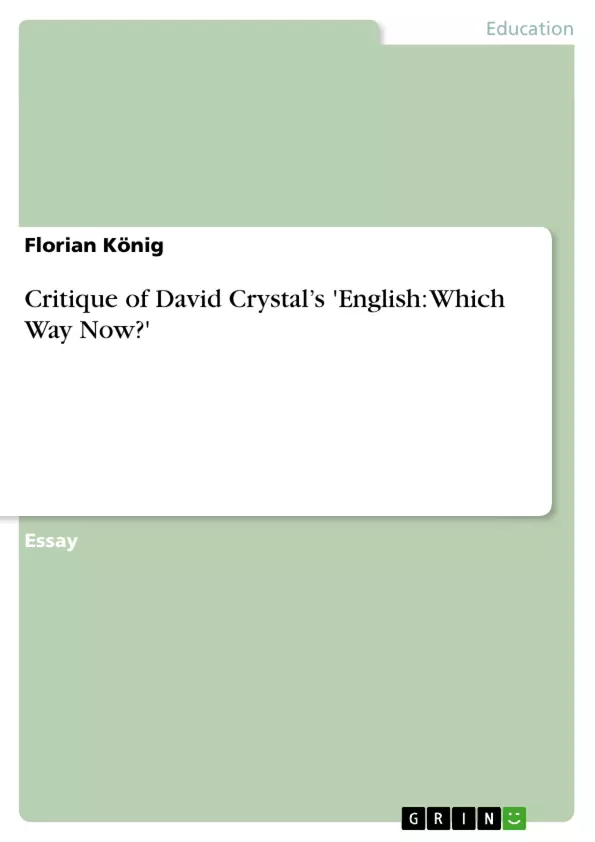David Crystal who currently holds a position as honorary professor and part-time lecturer of linguistics at the University of Wales, Bangor, is a renowned author and editor whose works are mainly in the field of English language studies. He worked under Randolph Quirk as a researcher in the early 1960s and received an Order of the British Empire (OBE) for his services to the English language in 1995. Crystal is the patron of the International Association of Teachers of English as a Foreign Language (IATEFL) and the Association for Language Learning (ALL), but is, according to his website1, best known for his two encyclopedias for Cambridge University Press, The Cambridge Encyclopedia of Language and The Cambridge Encyclopedia of the English Language.
In his article “Emerging Englishes” which was published in the educational magazine Spotlight (April 2000, 54-58) as a reworked version titled “English: Which Way Now?”, Crystal lobbies for an International Standard English as a possible solution for the increasing number of English variants throughout the world.
Inhaltsverzeichnis (Table of Contents)
- I. David Crystal: A Leading Linguist
- II. Critique of Crystal's Argument for an International Standard English
- A. The Enduring Status of English as the Global Lingua Franca
- B. The Continued Relevance of Standard Varieties
- C. The Benefits of Vocabulary Expansion
- D. The Influence of American English
- III. Conclusion
Zielsetzung und Themenschwerpunkte (Objectives and Key Themes)
This essay critically examines David Crystal's argument for an International Standard English, presented in his article "English: Which Way Now?". The essay aims to assess the validity of Crystal's claims in the context of the evolving global landscape of English.- The future of the English language
- The role of standard varieties of English
- The impact of globalization on language
- The need for an international standard English
- The influence of American English
Zusammenfassung der Kapitel (Chapter Summaries)
This essay analyzes David Crystal's article "English: Which Way Now?" and challenges his argument for an International Standard English. The author acknowledges Crystal's impressive credentials as a linguist but presents counterarguments to Crystal's claims about the future of the English language. The essay begins by outlining Crystal's concerns about the fragmentation of English due to the growing number of English speakers worldwide. It then presents arguments against Crystal's proposed solution of an international standard.
The essay argues that English will likely remain the global lingua franca, despite the increasing use of English as a second language. It further asserts that standard varieties of English, such as American and British English, will continue to serve as models for proper grammar and language use. The essay also defends the concept of vocabulary borrowing as a natural and enriching process for language evolution, arguing that it should not be seen as a threat to the integrity of English.
The essay concludes by acknowledging the complexity of predicting the future of language but ultimately refutes Crystal's argument for a singular international standard. It asserts that the center of authority regarding the English language will likely remain with native speakers and that the diversity of English varieties will continue to flourish.
Schlüsselwörter (Keywords)
This essay focuses on the future of the English language, exploring the concepts of standard varieties, language change, global language use, and the influence of American English. It critically examines David Crystal's arguments for an International Standard English and presents counterarguments based on the continued relevance of standard varieties and the enriching effects of language borrowing. Key themes include the role of language in globalization, the evolution of language, and the persistence of standard forms in a diverse linguistic landscape.Frequently Asked Questions
Who is David Crystal?
David Crystal is a renowned linguist, author, and honorary professor known for his extensive work on the English language, including the Cambridge Encyclopedia of Language.
What is David Crystal's argument in "English: Which Way Now?"
Crystal lobbies for the establishment of an "International Standard English" to address the increasing fragmentation of English into many global variants.
Why does the author of the essay critique Crystal's view?
The author argues that standard varieties like British and American English will remain dominant models and that vocabulary expansion through borrowing is a benefit, not a threat.
What role does American English play in this discussion?
The essay highlights the continued influence of American English as a major standard that provides a framework for grammar and usage globally.
Is English losing its status as a global lingua franca?
No, the essay asserts that despite the rise of diverse variants, English is likely to maintain its enduring status as the primary global language for communication.
What is the author's conclusion regarding a singular international standard?
The author refutes the need for a singular international standard, suggesting that the diversity of English varieties will flourish while native speaker authority remains central.
- Citation du texte
- Florian König (Auteur), 2008, Critique of David Crystal’s 'English: Which Way Now?', Munich, GRIN Verlag, https://www.grin.com/document/137974



